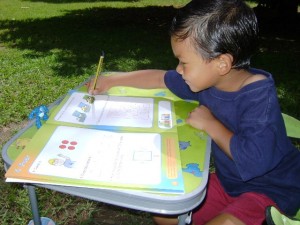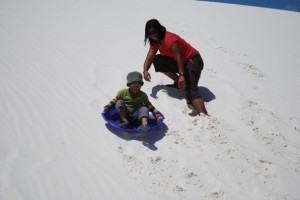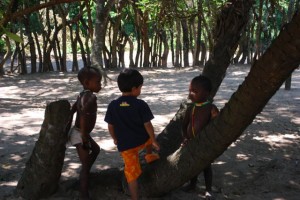Saturday November 22, 2008
By Yasmin Rose Karim
While some people are able to find magic within the parameters of home, a couple and their toddler decided to go further afield.
They had their passport photos scrutinised in 28 countries, but London-based Capt Ghani Ishak, 61, his wife Alison Murugesu, 37, and their son Adrian, 4, aren’t your average package tourists who fly in, breeze through the main attractions and jet off to the next destination.
Travelling overland, the family is using a 4WD to get through five continents in a 30-month-long expedition called Malaysians in Motion.
“The idea was first mooted by Ghani in November last year. Despite his health hiccups, he wanted us to experience the greatest adventure of our lives together. Some thought we were mad but we felt there was no better time to do it then now, before Adrian starts schooling,” says Alison, a hotelier.
 Capt Ghani Ishak, wife Alison and son Adrian are on a 30-month expedition across five continents in their trusty 4WD named Tuah (pic, below).
Capt Ghani Ishak, wife Alison and son Adrian are on a 30-month expedition across five continents in their trusty 4WD named Tuah (pic, below). Groundwork and preparations took up to six months. On May 1, 2008, the family left London for a four-month trip across Europe and Morocco. As the first week passed, they slowly adapted to being away from home.
“We shelved our usual cares ie. work, maintaining a household and adopted new ones like where to camp, which way to go and what’s safe for Adrian etc,” says Alison.
The family is back in Kuala Lumpur for a short break before moving on to Cape Town, South Africa this month. From there, Tuah, their Nissan Patrol named after the legendary Malay warrior, will be shipped to New York for the North American, Canadian and South American legs of their adventure.

“Then it’s on to Australia for two months, before crossing over to Asia. By September 2010, we expect to arrive back in England,” says Capt Ghani, a barrister-at-law and master mariner.
To raise cash, the couple rented out their flat in Lockes Wharf, London. Rainforest Challenge (a 4WD adventure company) donated two places in an upcoming adventure expedition which they raffled off and presented the proceeds to Petpositive, a non-profit society in Malaysia that provides animal-assisted therapy for the disabled and elderly.
“We knew we must not spend more than RM6,000 a month, otherwise, we could end up abandoning the project halfway through. Thank God, the fuel prices have come down!” sighs Alison.
Spending around RM200 a day on this epic road trip, Ghani and Alison achieved an unparalleled closeness with Adrian and with each other through the shared experiences, like in Morocco when motoring through the narrow and winding Tondra Gorge — the toughest piste in the country — for five harrowing hours and watching swirling wind forming mini-cyclones on the way to Tinghir.
“Almost every day brought excitement and fun activities — having snowball fights in Andorra (a small country bordered by Spain and France), learning to tie a Berber headdress in Morocco, watching polar bears feeding on frozen grub at Ranua Wildlife Park in Finland, and seeing Adrian chase and being chased by squabbling ducks in Hamburg, Germany,” says Alison.
 The family in Morocco.
The family in Morocco. “We indulged curious onlookers who wanted to know about the expedition and Malaysia. And in Romania, we traded ice cream for Tourism Malaysia’s Visit Malaysia stickers, a VCD and a booklet on Malaysia,” she recalls fondly.
Some experiences, though, were downright bitter.
“Ghani’s dictaphone was swiped by a tout as we were trying to cross into Morocco at Ceuta, Spain. And at a highway rest, 60km outside Milan, Italy, Tuah’s front passenger window was smashed and my toiletries kit was stolen along with 20 days’ supply of contact lenses,” relates Alison.
While Adrian didn’t seem to understand the significance of the places he visited, the couple hopes he will be able to recollect his adventures when he’s grown up.
“We took thousands of photos and wrote online journals from his perspective. Perhaps it will help jog his memory,” says Alison.
“Even if at the end of it all, he lacks knowledge of his alphabets and arithmetic, hopefully he will be aware of other ways of life and cultures,” says Capt Ghani.
Adrian did learn a useful life lesson at a souk in Azrou, Morroco though — that nothing in life comes free.
 The 4WD with its roof tent.
The 4WD with its roof tent. “He accepted an apricot offered to him, and ended up having to trade his hat for it!”
While expecting the very best, the couple embarked on the expedition prepared for the worst.
“Ghani has had medical training and I have attended St John’s Ambulance basic First Aid and First Aid for babies and children, and we have been immunised against a litany of diseases. Global Doctors International Medical packed us a supply of medication, ointments, and a First Aid kit,” Alison says.
Their medical kit proved useful when Adrian fell into a prickly bush in Austria, but they weren’t at all prepared when Ghani had a stroke after enjoying fish and chips at a campsite in Fauska, Norway.
“I was in a bit of a daze. I heard Alison screaming for an ambulance and she was asking me whether I was all right,” recalls Ghani. “The ambulance got there in under 10 minutes and I’m OK now.”
The trip, says Ghani, has given them a fresh perspective on even the most mundane aspects of everyday life. Every interaction becomes a new experience offering pleasure and sometimes frustrations.
“In Romania I ended up with some kind of wild bird for dinner as my hand gesture which was meant to be fish was wrongly interpreted, while Alison’s vegetarian spaghetti turned out to contain some mystery meat,” he adds.
Total strangers have gone out of their way to come to the family’s aid, reinstating their faith in people’s kindness.
“We had tent trouble in Germany — one half refused to collapse, so we drove for 2½ hours with the rear up until we reached a workshop. A man named Mathiias Kruger and his mechanic set to work immediately. Using bicycle parts, he got the tent back in order after 90 minutes. The best part was he refused payment, insisting that it was a service from him!” says Capt Ghani.
En route, the family also met up with other Malaysians abroad.
“We were invited to the home of the director of Tourism Malaysia in Paris, Jeffri Munir, and had a scrumptious meal prepared by his wife.
Malaysia’s ambassador to Germany, Datuk Zakaria Sulong, invited us to his residence in Berlin for a Merdeka gathering he hosted. This was an extra special day for us as it was also Adrian’s fourth birthday,” says Alison.
 No charge: German Mathias Kruger didn’t charge Capt Ghani for the repairs he did on the roof tent.
No charge: German Mathias Kruger didn’t charge Capt Ghani for the repairs he did on the roof tent. “At a campsite in Helsinki, Finland we were approached by a Malaysian woman and her husband who spotted our Jalur Gemilang.And at a restaurant in Blagaj, Bosnia, we bumped into another Malaysian family who were on a short break,” adds Capt Ghani.
After having spent four months on the road, the couple admit to being wiser travellers.
“We packed far too many clothes for the first leg. On the next leg, besides one set of warm clothing and jackets, we are packing a few sets of comfortable, quick-drying pants and T-shirts, comfortable hiking shoes and flip flops,” says Capt Ghani.
“We are now very aware of how little one can live on and are quite amazed that we managed to do with the minimum when on the road. The amount of wastage we generate as a family on a daily basis is quite disgusting, and we will definitely endeavour to ensure we continue to do our bit for the environment,” he concludes.
Need a little nudge to go for that extended vacation you’ve been dreaming about? Log on to www.malaysiansinmotion.com for inspiration.









